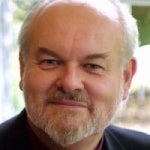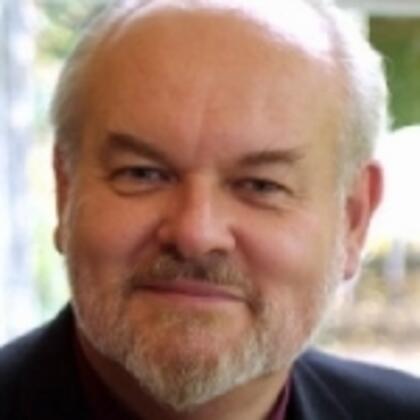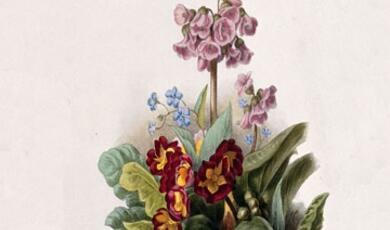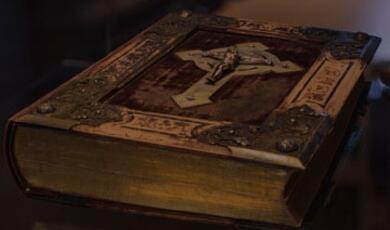Out of the Wasteland: Hope for a greener world
Share
- Details
- Text
- Audio
- Downloads
- Extra Reading
Sweet Thames, run softly, till I end my song.
Dr Richard Chartres, Bishop of London and Emeritus Gresham Professor of Divinity, is a prominent campaigner in the fight against global warming and for conserving natural resources, and is one of the international signatories to the Upsala Interfaith Climate Manifesto 2008. Here he addresses the hard facts and statistics of waste against the poetic London backdrop of T. S. Eliot's The Waste Land and offers a holistic vision for a sustainable future.
Download Text
Out of the Wasteland: Hope for a greener world
Rt Revd and Rt Hon Dr Richard Chartres
Bishops are often accused of talking rubbish. Tonight is probably the first occasion on which a bishop intends to talk rubbish.
'Sweet Thames, run softly till I end my song, Sweet Thames, run softly, for I speak not loud or long.'
You will recognise those encouraging lines from T.S.Eliot's poem The Wasteland, published soon after the First World War in 1922.It is one of the genuinely prophetic statements of the 20th century not in the sense that it foretells things to come but in that it is a 'forth-telling' from a level of awareness of what was buried beneath the surface of a civilisation, which in the 1920's appeared to have recovered its hectic pace and gaiety but which in reality was exhausted - a wasteland.
'What are the roots that clutch, what branches grow Out of this stony rubbish? Son of man, You cannot say, or guess, for you know only A heap of broken images, where the sun beats, And the dead tree gives no shelter, the cricket no relief, And the dry stone no sound of water.'
There had of course been a profound crisis of faith for more than a century before the dreadful self-mutilation of Europe in the Great War. Widespread loss of awareness of the presence of the divine had created a vacuum in which political religions had established themselves. Nationalism, fascism and communism all promised a way out of the wasteland but their utopian experiments merely created a vast graveyard.
Still for good or ill, however, religion was seen as part of the world we had lost. It was not seen to be any part of the answer. Even on the part of people who hung onto their inherited beliefs, the assumption was that religion was destined to fade away, to become the marginal leisure interest of a handful of enthusiasts while secularisation and modernisation marched together hand in hand into a future designed by science and reason.
David Jones, also like Eliot a convinced Christian, expressed this spiritual weariness in his poem, Anathemata published after the Second World War in 1952 -'at the sagging end and chapter's close'.
He describes priests officiating at the Eucharist.
'These rear guard details in their quaint attire, heedless of incongruity, unconscious that the flanks are turned and all connecting files withdrawn or liquidated - that dead symbols litter to the base of the cult-stone, that the stem by the palled stone is thirsty, that the stream is very low.'
'The cult man stands alone in Pellam's land: more precariously than he knows he guards the signa: the pontifex among his house treasures, [the twin urbes his house is] he can fetch things new and old:'
'Within the railed tumulus he sings high and he sings low.
In a low voice as one who speaks where a few are, gathered in a high-room and one, gone out.'
Of course by this time the gilt had come off the homicidal political religions and the vacuum created by the collapse of belief in them was filled by other isms - consumerism and hedonism. And in their train they brought not a metaphorical wasteland but a real one.
Of course waste is as old as life itself. We owe many things to the ancient Greeks - science, philosophy, the tragic drama and the beginnings of the recorded history of municipal rubbish collection. The authorities in classical Athens established a rubbish dump a mile outside the city walls.
Ruins of public baths from the Roman period and sophisticated sewage systems like the one in Roman Lincoln also attest an admirable emphasis on personal hygiene and cleanliness in the urban centres of the ancient world.
It must be confessed that in this respect mediaeval London offered a sad contrast. Two streams served our city as public open sewers, the Walbrook and the Fleet, now confined below ground. Richer citizens built their privies so that they drained directly into these two tributaries which carried their ordure and much else into the Thames.
The City authorities did attempt to control this paradise for rats and breeding ground for the plague. In 1383 thy imposed a levy of 2 shillings a year on Walbrook privy owners and the practice was banned entirely in 1463.
There was a long struggle against dumping in the Thames itself. Richard II proposed a fine of £40 for anyone caught dumping rubbish in the Thames after the plagues of 1390 and 91. Richard Girling in his excellent book 'Rubbish' from which these details are drawn notes that butchers were exempted from the new regulations since so foul was their offal that they were allowed to drop it into the ebb tide.
I could multiply anecdotes from the mediaeval clocarium; I could descant on the siege of Sir Thomas Gresham's nose by an army of stinks in the London of Queen Elizabeth I, but it is before the dinner hour and I shall pass swiftly to the efforts of our Victorian forebears to remedy the situation.
The streets of London are difficult to navigate at present because of the number of holes in the road. Countless notices advertise that we are renewing London's Victorian sewers. It is a revelation of just how much we owe to Sir Joseph Bazalgette that his system has lasted until our own day. Work began on the Bazalgette design in 1858 after the 'Great Stink' forced Parliament to adjourn. It was finished in 1875 and opened by the Prince of Wales with the Archbishop of Canterbury, the former Bishop of London, A.C.Tait in attendance. Now Thames Water are planning two immense new relief tunnels to receive sudden deluges of rainwater which, with the baneful admixture of raw filth we can expect to occur more frequently in our city as the climate changes and the tarmacadaming of so many front gardens proceeds unchecked.
There may be a parable in the fact that the great grandson of Sir Joseph the Victorian public benefactor, Peter Bazalgette, is credited with having introduced the idea of Big Brother to the UK.
Victorian recycling was also impressively thorough, as readers of Dickens'Our Mutual Friend will recall. Henry Mayhew, the Co-Founder of Punch and author of the 4 volume survey London Labour and the London Poorpublished in 1861 describes both the rubbish collection round and the operation of the dust yard. Out of the grey mountain at the centre of the yard the sifters would extract broken bricks, oyster shells and rubble which could be sold as a foundation upon which concrete could be laid. Rags and bones went for paper making and glue. Tin went for the making of clamps for trunks. Boots and shoes were sold to the manufacturers of Prussian blue.
In the 20th century our waste largely disappeared from sight. Landfill sites proliferated and although there was contemporary concern about their impact and associated dangers in the inter war period, our rubbish in those pre-plastic, pre-chemical and pre-electronic days was as Girling says 'a much more benign and less volatile commodity than it is seventy-five years later.' In the 1930's most dustbins still justified their names by containing most dust and ash while the rag and bone men, the Steptoes of our vanished childhood, dealt with the metal, cloth and glass.
With the advent of the Second World War, we had other things to worry about. But war time austerity created a prudent, make-do-and-mend mentality in the generation who are now in their eighties and nineties.
There are in the London Library in the section devoted to 'Science-Sewage Disposal' two books by J.C.Wylie, the county engineer of Dumfries County Council. One of them entitled Fertility from Town Wastewas published in 1955. His was an optimistic view, informed by the immediate post war 'waste not; want not' philosophy.
But our country was changing. I am only in the springtime of my senility but I began life with a ration book which I still possess. Rationing was soon discarded however and inflation infected everything including our expectations. It became our duty to consume and our duty to junk to make room for the newest model. The result has been a Vesuvius of rubbish.
In a throw away culture nothing is designed to last and we have junk food and junk mail; junk and spam all calculated to appeal to our most superficial cravings.
In 1947, the year of my birth a patent was granted for the plastic coated, paper board milk container. The Tetra Pak was a boon and made possible sealed cartons that were hygienic. They are sterile so that the contents can be kept for months without refrigeration and this in turn reduces waste. They have been produced in huge numbers and the problem is disposing of them.
I have been contemplating the associated problem of 'disposable' coffee cups in our City. There must be thousands sold each day and there seems to be no easy way to compost or recycle these cups which are lined with a petroleum based plastic to prevent leaking. Superficial research on the internet suggests that biodegradable cups do in fact exist. The 'Ecotainer' has a liner made from corn instead of petrochemicals and in a blind trial of more than 5 million cups no one noticed any difference from the regular variety. Of course we shall have to investigate the embedded carbon in the material and manufacturing process and the economics of the scheme but I intend to see whether some of the church outlets which serve fair-trade coffee might also experiment with the biodegradable cups.
Girling's book of 2005 is alarming and important and has of course been followed by many more specialised studies confirming his general thesis that we are drowning in our rubbish.
There does, however, seem to be a despondency pervading the book, which tends to treat with derision any attempt to reform and discipline our appetites. He suggests with earthbound realism that human beings cannot re-invent themselves but his welcome re-discovery of original sin in the absence of any opening God-ward is simply immobilising.
He invokes Sir Thomas More to rubbish the hope of transformation in our way of being in the world. He explains that Utopia in Greek means No-place. Perhaps he has missed the depth of humour and ambiguity in More because Utopia can either mean outopia - noplace or eutopia - good place. But Girling will have it that Utopia 'stands for the unattainable and exists only in the minds of holy fools and ideologues.' This is certainly demonstrable from the recent history of those utopian societies which have lacked a sufficiently robust acceptance of our inherent sinfulness; our tendency to live selfish and inward looking lives dominated by our appetites.
But lethargy is one of the legacies of abandoned hope. It is a dangerous temptation to which it is fatal to yield. The prayer - 'Lord, let it just last my time' is a blasphemy which should be confessed.
Why should the church be concerned with these matters? There was considerable surprise when I was invited to chair a session at the Waste Management Conference at the ExCel Centre in Docklands, just over a week ago. The main speaker was Hilary Benn, the Secretary of State for the Environment.
He rehearsed some familiar facts. In the hour or so we shall be together in this Cathedral, as a nation we shall have produced enough rubbish to fill the Albert Hall. By this time tomorrow we shall have produced enough to fill Trafalgar Square to the top of Nelson's Column. Most of this waste still ends up in landfill. We bury it in the ground where it generates methane and accounts for 3% of our Carbon emissions.
Looking further afield we now know that the biggest 'landfill' site of all is in the Pacific Ocean where a continent of plastic soup, the Eastern and Western Garbage Patches cover an area equal to that of the United States.
At the same time as a nation we waste £10 billion worth of food every year - a third of what we buy. Part of the problem is as we know the way food is labelled. Some 370,000 tonnes of food is thrown away each year because it has passed its 'sell by date'.
I think that Clement Freud devised the best use of the phase - 'Best before' - as an inscription on a tombstone.
There are clearly ethical and moral problems associated with the way we waste the world but there is also a spiritual dimension.
In a famous analysis of the essence of the modern project, Max Weber pointed to the differentiation of what he called 'the cultural value spheres' and the way in which art, morals and science have been left free to pursue their explorations by their own lights and undisturbed by intrusions from other spheres. Theology has also been captive to this compartmentalised world and in particular has largely declared a truce with science on the grounds of mutual irrelevance. The result has been an explosion of knowledge and an increase in power over nature but this has brought us to a time when we are being impelled by the logic of our own researches to resume the search for a holistic wisdom capable of reconnecting the 'cultural value spheres' to one another.
The need for a more holistic wisdom is nowhere more obvious than in our response to the challenge of climate change and environmental degradation. Ecology, as a word, is itself a relatively new coinage and a witness to the need to find a more holistic way of describing the challenge that we face in the 21st century.
We are haunted by the question posed by T.S.Eliot, poet and churchwarden in another of his poems The Rock:-
'Where is the wisdom we have lost in knowledge' Where is the knowledge we have lost in information?'
Behold I show you a mystery. We have a great deal of knowledge about the facts, the causes and effects of climate change and environmental degradation but it seems to be hard to translate this knowledge into the degree of awareness which transforms our way of being in the world; the awareness which generates energy for the profound changes which are needed in the way we live now.
Prophecy should not be confused with strident talk about matters only dimly understood. It must be informed by the best possible science and history. It is with the science and history that the report which has shaped Church policy in this area begins. 'Sharing God's Planet' was presented to the General Synod in 2005 and it begins with actual observation in the real world.
Consideration of the facts however leads us rapidly to the conclusion that the challenges we face are bound up with our way of being in the world and the character of our awareness. Philosophical and social\spiritual changes have combined to widen the divorce between the human observer and the web of life in which we are, in reality, participants with dire consequences.
In reality we are as human beings participants in an animated web of life but we have come to regard ourselves as little gods licensed to exploit matter for our own commodity in a theatre of purely human willing. Dominance has been substituted for connectedness in our relation to the universe. Descartes frankly confessed that the motive behind his method of reasoning was to make man 'maitre and possesseur de la terre'. So it has proved.
There has been a shift of consciousness which has overwhelmed proper inhibitions on our innate tendency to treat the world in an exploitative way. This has contributed to the human factors which lie behind climate change and environmental degradation. Surreptitiously we have become gods by shrinking the pre-comprehensible God of the Bible, whose presence was acknowledged but whose existence was not debated, to a mere idea in our own minds which in course of time we have discovered we can do without.
We waste and rubbish and treat planet earth in a destructive god-forsaken way because we see things in a destructive, god-forsaken way. But we have also recently begun to turn this way of seeing on ourselves. No longer is there the huge and vaulting confidence of the Victorian atheists who hailed human liberation from the tutelage and tyranny of God as the dawn of new age of progress and prosperity. We have begun to suspect that all the talk about love and justice is a mask with certain genetic and evolutionary advantages for a cunning and rapacious animal. Behind the rhetoric of humanism, there is a modern lurking suspicion that we are little more than 'rapacious self interested exploiters whose success depends on converting all around us [other people, relationships, resources] into commodities and consumables.' [Jonathan Porritt] No wonder there is despondency.
This state of consciousness is increasingly exposed and challenged by the ecological distresses to which it has given rise while it is in sharp contrast to the Biblical picture of our relationships as human beings, - our relationship with God; the creation and our neighbours.
It is important to note that the Biblical tradition goes beyond merely commending care for creation as it is, but also enrolls human beings as co-creators with God. This is what we assert every time we offer bread at the Eucharist as 'fruit of the earth and work of human hands'.
The Bible does not imply a rejection of the idea of development. According to the Book of Genesis we are to 'dress and keep' creation. This implies a balance between care and development. But maintaining such a balance depends on a lively sense of being alive in God's world where the first step in becoming a human being is to refuse to be a little god.
Human beings are hungry and thirsty creatures. When it says in the book of Genesis that God breathed into the first human being and 'man became a living soul', the word for 'soul' used in this passage is 'nephesh' which also had the ancient meaning of 'throat'. Human beings are hungry and thirsty not only for the wherewithal to sustain existence but for meaning and joy in life. For many their search for the wherewithal to satisfy their hunger and thirst is concentrated on acquiring and accumulating things beyond any definition of need but for some there is a breakthrough to a deeper thirst which no-thing can slake, only immersion in the living God and a life of faith.
I frequently meet people who expect me as a bishop to be shocked when they shyly confess to having doubts about this or that idea about God. They in turn are confused when I insist that doubt is not the opposite to faith. Indeed it may be a gift to winkle us out of an immature understanding of faith and to prepare is for a new depth of realism and awareness.
Faith is an orientation. It is living with courage with an awareness of that dimension of life which we cannot see but like some hypothesis in science invisible to eyes and instruments we know must be there because life does not make much sense if reaching towards God is absent.
The real opposite to faith is a life lived turned in upon ourselves. That is the classical definition of sin a word that has come down in the world. It is more than this or that peccadillo. It is living a life 'incurvatus in se' as Luther said and as such is a state which many risk averse people find themselves to be in.
Stripping off the surface self, the masking self with which our ancestors covered themselves so as to hide from the living God in the Paradise Garden; to be in the state in which Jesus presented himself to the Father; progressively simplifying our lives and embracing in all humility our creatureliness; kissing as St Francis did the leper - that is the hard way through the barrier of fear to joy and liberation.
Any contemporary approach to the ecological distresses of the planet from a Christian point of view requires personal action not only because tactically we ought to put our own house in order before we lecture others [which is true] but also because returning to the humus and to our bodies is a pre-condition for a strengthening of the awareness needed for greater spiritual adventure in a joyful spirit.
But as we saw in the Jubilee 2000 campaign to cancel third world debt, the Christian community with allies from other faiths and people of simple good will can make a difference by putting the subject on the agenda and by demonstrating that there is a constituency for change. In this way they can enlarge the room for manoeuvre so that sympathetic politicians can be emboldened to act without placing themselves too far distant from public opinion.
Conservative estimates of the numbers of Christians worshipping in any ordinary week in the Greater London Area suggest that there are 650,000 people assembling for worship in more than 4,000 churches. This is a non trivial fact and if any political party assembled such numbers regularly we should hear about it.
Standing on Dover Beach towards the end of the 19th century, Matthew Arnold pictured the sea of faith ebbing, 'retreating to the breath of the night wind down the vast edges drear and naked shingles of the world'. The tide was going out but perhaps unnaturally far, leaving fish stranded and the sea floor exposed. One child on a Thai holiday beach read the sign correctly and saved her family. Run she shouted because such a recession of the tide is a sign of an approaching Tsunami.
In a cosmopolitan place like London, a world in a city, there are many signs of increasing turbulence and of the spiritual tsunami that is building among the very youthful population of the world in places like the vast housing projects in greater Cairo and in the megalopolises of South America.
In a way that bewilders members of yesterday's Anglo-American avant garde it is already clear that the four to five billion people in the world, who follow some kind of spiritual path, are not going to conform to what until recently was seen to be the inevitable consequence of modernisation - that is the relegation of religion to the margins of life.
It is another sign of a sea change that the editorial team at the Economist has decided that the reality of the contemporary world cannot be described without reporting its religious news. The Editor has recently co-authored a book with the provocative title 'God is Back'. Five years ago ink would not have been wasted on something which was seen to have no value in understanding the daylight world.
As the fact of our spiritual and material wasteland sinks in, many commentators have looked with hope to the Church and her spiritual resources as a potential ally in the common struggle for a more sustainable way of living.
One obvious example is the urgent need for a Christian re-discovery of the Sabbath as the crown of creation and a festival of equilibrium and enoughness.
The Genesis narrative asserts that creation reaches its consummation not in the creation of human beings on the sixth day but in the peace of the Sabbath on the seventh. At the same time the Sabbath concept when related to the fallow season for the earth points to the need for respect for our common home and restraint on human intervention and exploitation of the natural order.
I believe that the Sabbath festival is one of the ways in which we shall unmask the unsustainable and intolerable character of the project in which we are most of the time unconsciously caught up. The official religion of optimism has as one of its central tenets that we can sustain growth without limit with no end in view beyond the process itself. Simply to state matters thus unmasks the unreality of the state we are in.
Rather than being a mere pause between bouts of activity, the Sabbath was to be a feast of contentment. The rhythm of Sabbath days and Sabbath years reclaims time itself from being a mere succession of passing moments. It gives life a shape which flows from the recognition that creation was brought into being not to serve any transient human purpose but to be material for the praise and glory of the Creator. Needless to say our Jewish relatives have much to teach us in this respect.
I believe that we are now close to a tipping point in popular consciousness and we must play our part as followers of Jesus Christ in indicating clearly what one person, what single communities can do to develop a transforming awareness of the peril in which we stand and to assist a shift into a way of living wisely.
We all need conversion to a way of living wisely which leads to progressive transformation. Conversion means turning from the attempt to satisfy our hunger and thirst by consumption alone. Consumers are called to grow into citizens and communicants, beings in communion with God's creation; then perhaps we shall know the joy which comes with being a true contemplative.
Too much ecological concern seemed to be tinged with a certain joylessness. Christian ascesis is not so much an invitation to be measured for a hair shirt as a re-discovery of that balance between feasting and fasting which brings joy.
Science helps us in this transformation of awareness. The man-centered and reason dominated world view of the Enlightenment, to which theology contributed not a little, has been challenged by Darwinism which, whatever its other reductionist tendencies, has returned human beings to their organic place in nature. This has restored the perspective which informs the symbolism of Genesis II in which God forms 'adam', the earth creature out of the very dust - 'ha'adam'.
As a generation we are becoming more aware of the distress which is a bye product of the wasteland. We are becoming more sensitized what is happening to nature, society and the self; the scars on the environment; the strain on relationships between neighbours and families and the bewilderment and loss of meaning in individual lives. This new awareness is especially acute among children. Our primary schools are in this respect beacons of hope.
Many people experience the way we live now as existing in the wasteland with a suppressed fear of death and a hectic lifestyle developed in the hope that living faster will mean that we get more out of this short life. This is why rhythm in life has been abolished by twenty four hour shopping and the season of fasting has been swept away in favour of perpetual carnival with no ensuing Lent.
We have to relearn that wisdom and meaning come with a progressive diminution of egotism and the discovery that serving others is the road to freedom and fulfillment. The more you let go of self the more you grow in soul. You cannot live in this way by mere wishful thinking there has to be spiritual practice, I would say daily prayer at least, prayer and meditation which dispels illusions, together with just and generous living.
We are creatures of the dust - star dust in fact as both Genesis and Darwin affirm. We are called to be viceroys in the creation, but we are still participants in this animated universe. The habit of viewing everything as an object, and as a commodity to be exploited to realise our desires, both drains our world of life and drama, and scars the face of the earth.
We are so used to being flattered and spared any suggestion that 'all have sinned' that any suggestion that this is the case is met with indignation and denial. Ecological wisdom comes with the confession that we are all, to some extent, strangers and aliens and have gone out of communication with God, his creation, our neighbours and, indeed, our own deepest wellbeing.
Much of our world is dominated by the 'Spectres' described by Philip Pullman in His Dark Materials. He writes about them in this way:
The Spectres of indifference are a way of picturing the fatal nature of melancholy and accidie. They feed on dust (the embodiment of conscious knowledge) and thus children who have less of it are immune while adults succumb. The Spectres were let into the world by men of learning who were enquiring into the deepest nature of things and thought that the bonds of creation could be negotiated.
By contrast, the Spirit with outstretched wings broods over the face of the void and anyone who is oriented to Her is a channel of the renewal of the face of the earth.
We have been called to live at a time of huge promise and peril. I believe that we shall only convince and help our neighbours if the Church is seen to be living with the quality of awareness which derives from our encounter with the Word and which shines through the writings of St Isaac of Nineveh, born in Qatar, a Bishop in Northern Iraq. I shall conclude my reflections with his words. St Isaac wrote: An elder was once asked, 'What is a compassionate heart?' He replied, 'It is a heart on fire for the whole of creation, for humanity, for the birds, for the animals, for demons and all that exists. At the recollection and at the sight of them such a person's eyes overflow with tears owing to the vehemence of the compassion which grips his heart; as a result of his deep mercy his heart shrinks and cannot bear to hear or look on any injury or the slightest suffering of anything in creation.'
© Rt Revd and Rt Hon Dr Richard Chartres, 23 June 2009
Part of:
This event was on Tue, 23 Jun 2009
Support Gresham
Gresham College has offered an outstanding education to the public free of charge for over 400 years. Today, Gresham College plays an important role in fostering a love of learning and a greater understanding of ourselves and the world around us. Your donation will help to widen our reach and to broaden our audience, allowing more people to benefit from a high-quality education from some of the brightest minds.


 Login
Login






